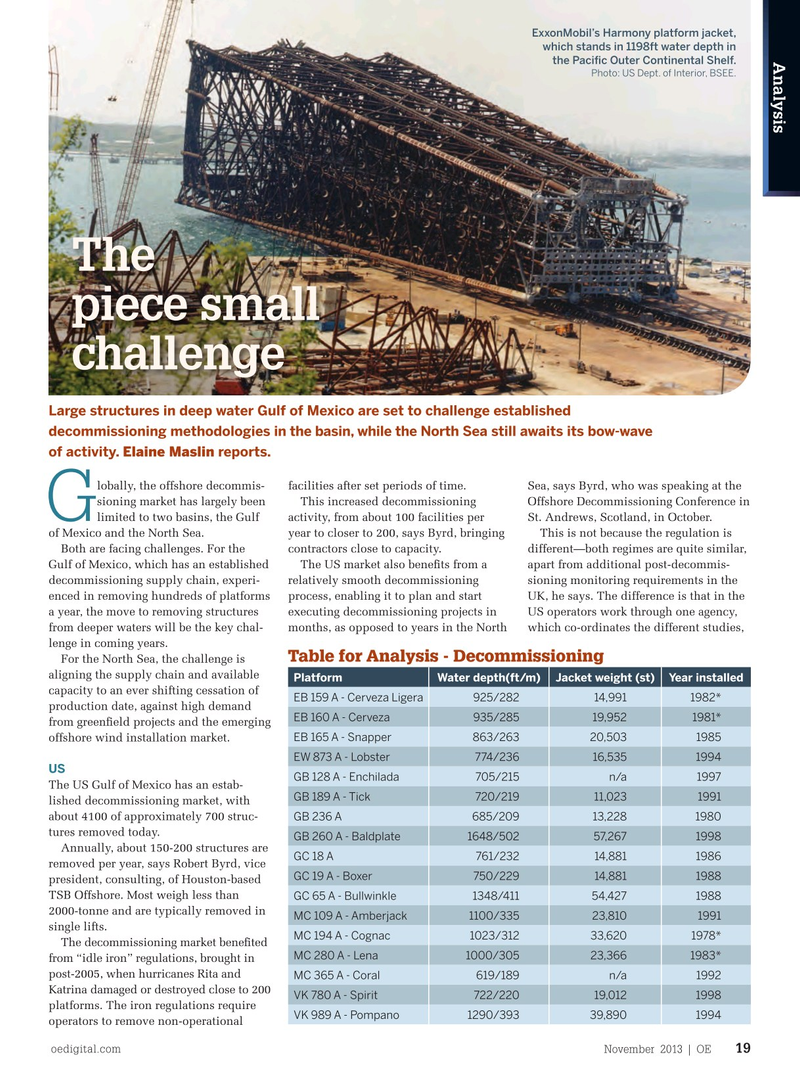
Page 17: of Offshore Engineer Magazine (Nov/Dec 2013)
Read this page in Pdf, Flash or Html5 edition of Nov/Dec 2013 Offshore Engineer Magazine
ExxonMobil’s Harmony platform jacket, which stands in 1198ft water depth in
Analysis the Pacifc Outer Continental Shelf.
Photo: US Dept. of Interior, BSEE.
The piece small challenge
Large structures in deep water Gulf of Mexico are set to challenge established decommissioning methodologies in the basin, while the North Sea still awaits its bow-wave of activity. Elaine Maslin reports. lobally, the offshore decommis- facilities after set periods of time. Sea, says Byrd, who was speaking at the sioning market has largely been This increased decommissioning Offshore Decommissioning Conference in
G limited to two basins, the Gulf activity, from about 100 facilities per St. Andrews, Scotland, in October.
of Mexico and the North Sea. year to closer to 200, says Byrd, bringing This is not because the regulation is
Both are facing challenges. For the contractors close to capacity. different—both regimes are quite similar,
Gulf of Mexico, which has an established The US market also benefts from a apart from additional post-decommis- decommissioning supply chain, experi- relatively smooth decommissioning sioning monitoring requirements in the enced in removing hundreds of platforms process, enabling it to plan and start UK, he says. The difference is that in the a year, the move to removing structures executing decommissioning projects in US operators work through one agency, from deeper waters will be the key chal- months, as opposed to years in the North which co-ordinates the different studies, lenge in coming years.
Table for Analysis - Decommissioning
For the North Sea, the challenge is aligning the supply chain and available
Platform Water depth(ft/m)Jacket weight (st)Year installed capacity to an ever shifting cessation of
EB 159 A - Cerveza Ligera 925/282 14,991 1982* production date, against high demand
EB 160 A - Cerveza 935/285 19,952 1981* from greenfeld projects and the emerging
EB 165 A - Snapper 863/263 20,503 1985 offshore wind installation market.
EW 873 A - Lobster 774/236 16,535 1994
US
GB 128 A - Enchilada 705/215 n/a 1997
The US Gulf of Mexico has an estab-
GB 189 A - Tick 720/219 11,023 1991 lished decommissioning market, with about 4100 of approximately 700 struc-
GB 236 A 685/209 13,228 1980 tures removed today.
GB 260 A - Baldplate 1648/502 57,267 1998
Annually, about 150-200 structures are
GC 18 A 761/232 14,881 1986 removed per year, says Robert Byrd, vice
GC 19 A - Boxer 750/229 14,881 1988 president, consulting, of Houston-based
TSB Offshore. Most weigh less than
GC 65 A - Bullwinkle 1348/411 54,427 1988 2000-tonne and are typically removed in
MC 109 A - Amberjack 1100/335 23,810 1991 single lifts.
MC 194 A - Cognac 1023/312 33,620 1978*
The decommissioning market benefted
MC 280 A - Lena 1000/305 23,366 1983* from “idle iron” regulations, brought in post-2005, when hurricanes Rita and
MC 365 A - Coral 619/189 n/a 1992
Katrina damaged or destroyed close to 200
VK 780 A - Spirit 722/220 19,012 1998 platforms. The iron regulations require
VK 989 A - Pompano 1290/393 39,890 1994 operators to remove non-operational oedigital.com November 2013 | OE 19 019_OE1113_ Analysis.indd 19 10/28/13 1:22 AM

 16
16

 18
18